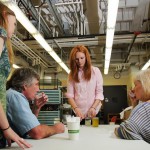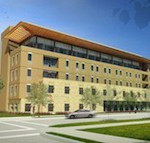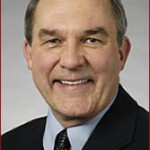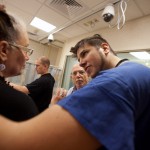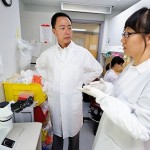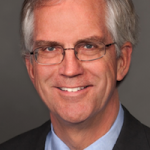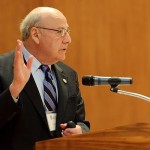Tag School of Medicine and Public Health
Researchers discover early step in blood stem cell development
University of Wisconsin School of Medicine and Public Health (SMPH) researchers have discovered a very early regulatory event that controls the production of blood stem cells and the adult blood system.
Teach-in to help “Young Invincibles” select health insurance options
A teach-in on new health insurance options is designed to send students home for Thanksgiving with important information to discuss with their families.
Lead exposure dooms some Wisconsin kids to struggle in school
Two studies funded by the Wisconsin Partnership Program paint a grim reality for Wisconsin children exposed to lead before age 3.
Hitchhiking virus confirms saga of ancient human migration
A study of the full genetic code of a common human virus offers a dramatic confirmation of the "out-of-Africa" pattern of human migration, which had previously been documented by anthropologists and studies of the human genome.
Tasty Solution: Better beverages for people who have trouble swallowing
After having a stroke in 2008, Jan Blume lost the ability to swallow for two full years. As she slowly regained that vital function, she faced a new challenge: drinking the thickened beverages that are recommended for people with swallowing problems, or dysphagia. She found the drinks almost intolerable.
Waisman early childhood alum pursues career of caring
When Bridget Muldowney was a little girl, she and her friends at the Waisman Early Childhood Program (WECP) would look up from the playground every time the noisy Med Flight helicopter landed at UW Hospital across the street. Today, she’s across the street herself.
Essential mechanism of symbiosis found in Hawaiian squid
Experiments at the University of Wisconsin–Madison with a small squid that glows in the dark have uncovered a complex conversation that allows the newly hatched squid to attract the glowing, symbiotic bacteria that disguises it against predators.
UW researchers witness new type of cell division, use it to battle cancer
While on their way to finding a means to attack certain types of cancers, the researchers made the first observations of cytofission in humans, a type of cell division that occurs at a different time than normal division.
Longtime medical school mentor Don Schalch, 83, enjoys the journey
Although he retired in 1999, Don Schalch still rides his bicycle 12 miles round trip to work at the School of Medicine and Public Health every day as a part-time faculty member - at age 83.
Pioneering UW nursing educator Signe Skott Cooper dies at 92
Signe Skott Cooper, who devoted over 60 years of her life to nursing education at the University of Wisconsin–Madison and within the UW System, culminating in the naming of the future home of the School of Nursing for her, passed away on July 16, 2013, at Agrace HospiceCare in Madison at the age of 92.
In a sea of data, Bioinformatics Resource Center rides genomic wave
In July 2012, the UW–Madison Bioinformatics Resource Center opened for business, providing one-stop shopping for genetic sequencing, genome assembly, analysis and a host of services to help UW–Madison faculty and others make sense of the sea of data generated by new technologies that have put the secrets of human, plant, animal and microbial genomes within tantalizing reach.
Whose ER response is better? Medical faculty, residents compete in ‘Sim Wars’
In one room of the simulated emergency department, Assistant Professor of Medicine Mary Westergaard futilely applies chest compressions to a child manikin. The script says the boy hasn’t had a pulse since he arrived in the Med Flight helicopter and that gray matter leaking from his brain indicates a severe head injury.
Waisman scientists model human disease in stem cells
Many scientists use animals to model human diseases. Mice can be obese or display symptoms of Parkinson's disease. Rats get Alzheimer's and diabetes. But animal models are seldom perfect, and so scientists are looking at a relatively new type of stem cell, called the induced pluripotent stem cell (iPS cell), that can be grown into specialized cells that become useful models for human disease.
Morgridge Institute taps biomedical innovator as chairman
The trustees of the Morgridge Institute for Research at the University of Wisconsin–Madison have named Fred Robertson as chairman, replacing outgoing chairman Ernie Micek, whose term as chair has ended and who will remain on the board.
Ned Kalin – revealing disorders of the brain
Dr. Ned Kalin, chair of the Department of Psychiatry, is an accomplished biological psychiatrist whose research focuses on anxiety. Through imaging studies and understanding the genetic and environmental components of mental illness, his lab is working toward discoveries that can form the basis of early interventions to treat children who are at risk of developing long-term anxiety and related psychiatric disorders.
UW service-learning project wins United Nations award
An award from the United Nations is honoring the work of Araceli Alonso, a senior lecturer in Gender and Women's Studies and a faculty associate at the School of Medicine and Public Health at the University of Wisconsin–Madison.
Stem cell transplant restores memory, learning in mice
For the first time, human embryonic stem cells have been transformed into nerve cells that helped mice regain the ability to learn and remember.
Expanded Science Expeditions opens doors to UW–Madison research
Ana Garic spends her days in a University of Wisconsin–Madison lab studying a public health problem with real impact in Wisconsin communities — which is why it feels so good to invite the public onto her turf for the campus’ annual Science Expeditions open house to be held April 5-7.

